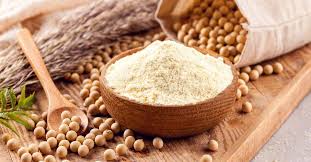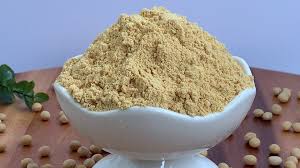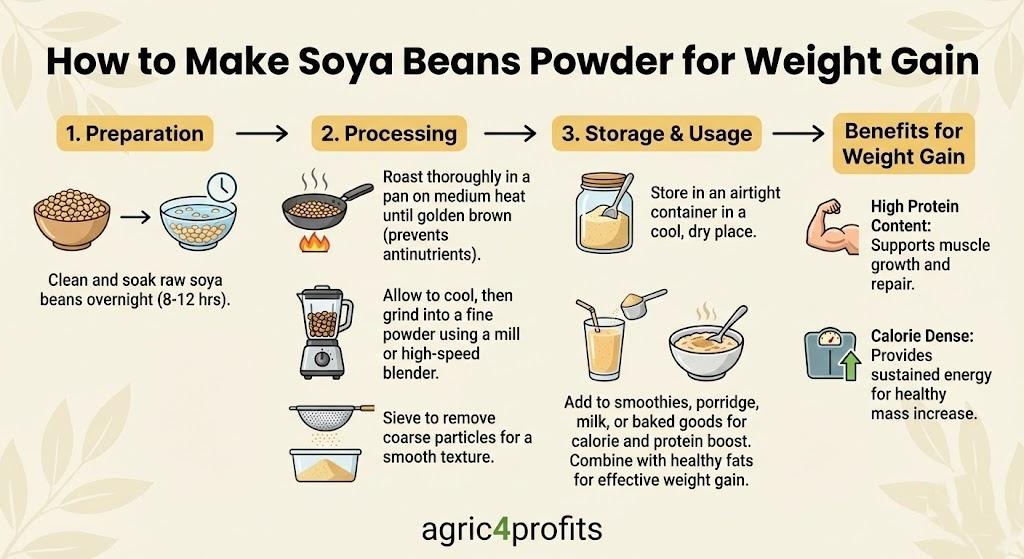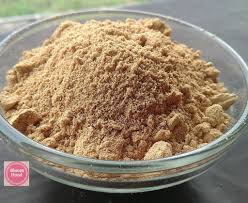Soya beans powder is a versatile and nutrient-dense food, ideal for anyone looking to gain healthy weight. Packed with protein, healthy fats, and essential vitamins, soyabean powder can be a game-changer when included in your diet.
Learning how to make soya beans powder at home is simple and affordable, and with the right ingredients for making soya beans powder, you can customize it to suit your nutritional needs.
Whether you are wondering how to prepare soya beans powder or interested in variations like how to make soya beans powder with dates for added flavor and energy, this article will guide you through it all.
Soya beans, scientifically known as Glycine max, are one of the most valuable crops grown globally due to their high nutritional content and versatility.
Native to East Asia, they have become widely cultivated across various continents, including Africa, where they are now a significant part of local diets.
In Nigeria, soya beans have gained immense popularity as a source of plant-based protein, making them an essential crop for both subsistence and commercial farming.
In many homes, soya beans are transformed into various products such as soy milk, tofu, and soya beans powder, which can be used for several culinary purposes, including baby food, weight gain supplements, and protein-enhanced recipes.
Soya beans are celebrated for their rich nutritional profile. They are one of the few plant-based foods that provide all nine essential amino acids, which are critical for body functions like muscle repair and overall growth.

This high protein content has made soya beans a popular choice among vegetarians and those who want to reduce their intake of animal-based products.
Additionally, soya beans are a great source of healthy fats, particularly omega-3 and omega-6 fatty acids, which are essential for maintaining heart health.
The beans are also high in dietary fiber, which aids digestion and helps in maintaining healthy cholesterol levels. Moreover, they are rich in vitamins such as vitamin K, B vitamins (notably folate), and essential minerals like calcium, potassium, magnesium, and iron.
These nutrients make soya beans a nutrient-dense food that provides energy and promotes overall health. For individuals in Nigeria and other parts of the world, learning how to make soyabeans powder at home has become an effective way to incorporate the nutritional benefits of soya beans into everyday meals.
Soya beans powder is an excellent choice for those who want to increase their protein intake without relying on animal-based products. It can be added to smoothies, porridge, baked goods, and even soups to boost the protein and nutritional content of the meal.
Making soya beans powder at home also ensures that you get a fresh and preservative-free product, which is particularly important for those who prefer natural and additive-free foods.
The process of how to make soyabeans powder in Nigeria is relatively straightforward, although it does require some time and patience. The first step is to clean the soya beans by removing any dirt, stones, or damaged beans.
Cleaning is crucial to ensure that the powder is pure and free of contaminants. After cleaning, the beans are soaked in water for about eight to twelve hours.
Soaking the soya beans softens them and prepares them for the next stage of the process. Once the beans have soaked, they are drained and rinsed to remove any remaining debris or impurities.
The next step in how to make soya beans powder at home involves boiling the beans. The soaked beans are placed in a pot of water and brought to a boil, cooking them for about thirty to forty-five minutes.
Read Also: Traditional And Modern Practices In Herbal Medicine
The beans should be soft enough to be easily crushed between your fingers. Boiling the beans is essential as it eliminates the raw taste of the beans and ensures that they are fully cooked before they are turned into powder. Once the beans are cooked, they are drained and allowed to cool.
After boiling, the beans need to be thoroughly dried to prepare them for grinding. Drying can be done by spreading the beans on a clean kitchen towel and leaving them to air dry for several hours.
Alternatively, they can be dried in an oven at a low temperature for a quicker process. In Nigeria, sun drying is also a popular method, particularly in areas with high temperatures and plenty of sunlight.
Proper drying is crucial because if the beans are not completely dry, the resulting powder can become clumpy and difficult to store. Once the beans are completely dry, the final step in how to do soya beans powder is grinding them into a fine powder.
This can be done using a blender or a food processor, depending on what is available. It is important to grind the beans in small batches to ensure that the powder is fine and uniform in texture.
If there are any coarse particles left after the first round of grinding, they can be sifted out and ground again. The result should be a smooth, fine powder that can be easily incorporated into various recipes.
Soya beans powder made at home can be stored in an airtight container to keep it fresh for several weeks. Keeping the powder in a cool, dry place will ensure that it stays fresh and free from moisture, which can cause it to spoil.

In Nigeria, making soya beans powder at home has become increasingly popular, not only because it is a cost-effective way to consume this nutrient-rich food, but also because it offers the flexibility to customize the powder according to individual preferences.
For example, some people choose to lightly roast the beans before grinding them to enhance the flavor of the powder, while others may mix it with spices like cinnamon or ginger to create a flavored variant.
Incorporating soya beans powder into daily meals is a great way to enhance their nutritional value. For babies and children, the powder can be mixed with their porridge or cereal to provide extra protein and essential nutrients necessary for growth and development.
For adults looking to gain weight or improve muscle mass, adding soya beans powder to shakes, smoothies, or even baked goods can help boost caloric intake while providing high-quality protein. Moreover, soya beans powder can be used as a thickening agent in soups and sauces, making it a versatile ingredient in many African kitchens.
Scientific Evidence and Case Studies on Soya Beans Powder

1. High protein for muscle growth: Studies confirm soya protein provides all essential amino acids and supports muscle protein synthesis similar to whey, aiding lean mass gain in resistance training.
2. Caloric density and weight gain: Research shows soy-based supplements increase caloric intake and promote healthy weight gain in underweight individuals without adverse effects.
3. Healthy fats and heart health: Omega-3 and omega-6 in soy improve lipid profiles and reduce inflammation, supporting sustainable weight gain with cardiovascular benefits.
4. Digestive and nutrient absorption: High fiber in soy enhances gut health and nutrient uptake, optimizing calorie utilization for effective weight gain.
5. Plant-based complete protein: Clinical trials demonstrate soy protein equals animal protein for muscle building and recovery in vegetarians and athletes.
Nutritional Value Of Soya Beans Powder
1. Protein: 35-40g per 100g, complete protein with all nine essential amino acids for muscle repair and growth.
2. Healthy fats: Rich in polyunsaturated fats (omega-3 and omega-6) for energy and heart health.
3. Carbohydrates: Provides sustained energy and contributes to caloric surplus for weight gain.
4. Dietary fiber: Supports digestion, prevents constipation, and aids nutrient absorption.
5. Vitamins: High in B vitamins (folate, thiamine), vitamin K, and vitamin E for metabolism and immunity.
6. Minerals: Excellent source of iron, calcium, magnesium, potassium, and zinc for bone health and energy.
7. Low in saturated fat: Promotes healthy weight gain without raising bad cholesterol levels.
Summary of Soya Beans Powder
| Aspect | Key Details |
|---|---|
| Origin & Description | Derived from Glycine max (soya beans), native to East Asia; popular in Nigeria as plant-based protein source |
| Nutritional Highlights | High in complete protein (35-40g/100g), healthy fats, fiber, B vitamins, iron, calcium, potassium; calorie-dense |
| Health Benefits | Supports healthy weight gain, muscle building, heart health, digestion; ideal for vegetarians/vegans and weight gain diets |
| Preparation Process | Clean, soak 8-12 hrs, boil 30-45 min, dry thoroughly, grind into fine powder; optional spices/dates for flavor |
| Uses & Versatility | Add to smoothies, porridge, shakes, baking, soups; enhances protein/calories in meals for babies, adults, weight gain |
| Storage & Tips | Airtight container in cool, dry place; lasts weeks to months; customize with dates, milk powder, or spices |
Frequently Asked Questions
1. What is soya beans powder?
Soya beans powder is a finely ground form of dried, processed soya beans, rich in complete plant-based protein, healthy fats, fiber, and essential nutrients.
2. How does soya beans powder help with weight gain?
It provides high calories, complete protein for muscle growth, and healthy fats/carbs for energy surplus, supporting healthy and sustainable weight gain.
3. What are the main steps to make soya beans powder at home?
Clean beans, soak 8-12 hours, boil until soft (30-45 min), drain and dry completely, then grind into fine powder using a blender.
4. Can I add dates to soya beans powder for weight gain?
Yes, blend softened, pitted dates into the powder after grinding for natural sweetness, extra calories, and enhanced flavor.
5. How much soya beans powder should I consume daily for weight gain?
Start with 2-4 tablespoons daily in shakes, porridge, or meals, adjusting based on your caloric needs and goals.
6. Is soya beans powder suitable for vegetarians and vegans?
Yes, it is an excellent complete plant-based protein source, providing all essential amino acids without animal products.
7. How long does homemade soya beans powder last?
Stored in an airtight container in a cool, dry place, it lasts several weeks to months; refrigerate for longer freshness.
8. Can children use soya beans powder for healthy weight gain?
Yes, it is nutritious for kids when added to porridge or smoothies, but consult a pediatrician before use.
9. What are the potential side effects of soya beans powder?
Excessive intake may cause bloating or gas due to fiber; those with soy allergies should avoid it.
10. How can I use soya beans powder in daily meals?
Add to smoothies, porridge, protein shakes, soups, baking (muffins/pancakes), or as a thickener for high-protein, calorie-boosted recipes.
Do you have any questions, suggestions, or contributions? If so, please feel free to use the comment box below to share your thoughts. We also encourage you to kindly share this information with others who might benefit from it. Since we can’t reach everyone at once, we truly appreciate your help in spreading the word. Thank you very much for your support and for sharing!
Disclaimer: This article is for educational and informational purposes only. The health benefits described are based on scientific research and traditional knowledge. They ayre not a substitute for professional medical advice, diagnosis, or treatment. Always consult a healthcare professional before using any herb or natural remedy for medical purposes.
Read Also: What is some advantages of solar energy?

